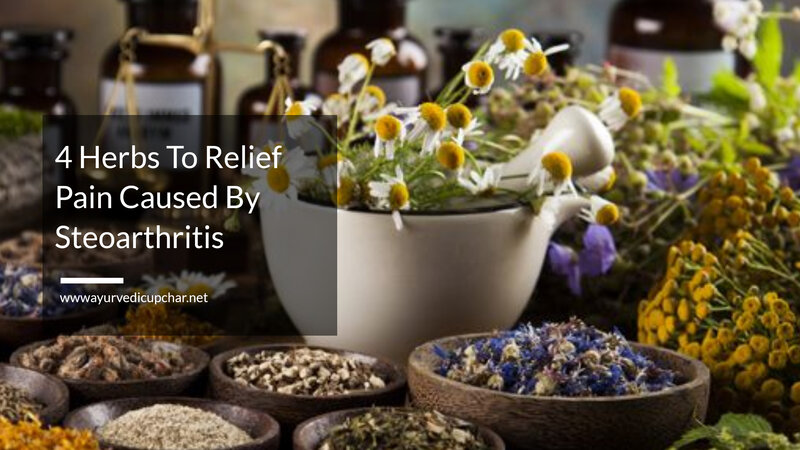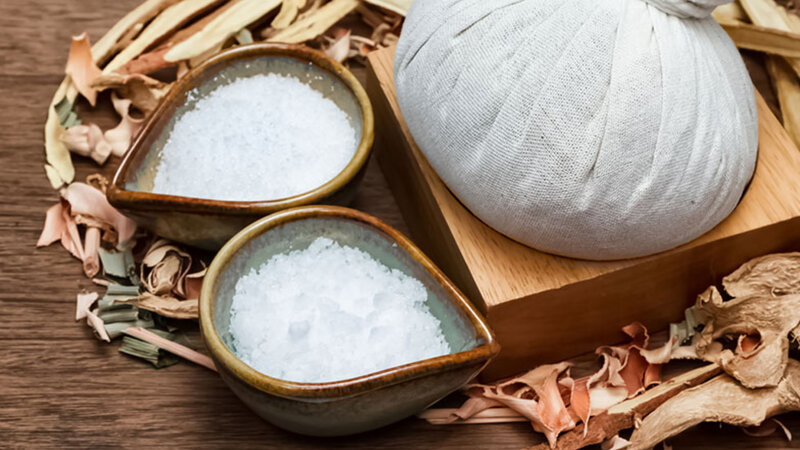4 Herbs To Relief Pain Caused By Osteoarthritis

Osteoarthritis may not be curable, but combining conventional medications and alternative therapies can relieve pain, swelling, and stiffness in the joints. Herbs such as capsaicin, ginger, Indian frankincense, and turmeric can be included in the diet directly or as supplements.
A regular exercise regimen that includes joint strengthening exercises, aerobics, and yoga will keep you mobile. In addition to a healthy diet to fight arthritis from the inside out, you need to plan your diet based on Ayurvedic principles. Acupuncture, massage, and thermotherapy may also help.
Osteoarthritis involves wear and tear on the protective cartilage around the joints and tends to affect a person as they get older. It can also bother young people after an injury. When the top layer of cartilage wears out or breaks down due to age, injury, or overuse, the bones underneath rub against each other, resulting in swelling, pain, and difficulty moving.
Medical science has yet to find a cure for this often disabling condition. On the other hand, there are several treatment options for controlling and treating osteoarthritis. In addition to over-the-counter medications, natural alternatives are available, such as herbal supplements, exercise regimens, and physical therapy.
These treatments can help slow the progression of osteoarthritis and improve quality of life. Here are a few options to help treat osteoarthritis.
What’s the best herb for osteoarthritis?
The evidence on the use of herbs for pain caused by osteoarthritis is still limited. Despite this, a study published in Preventive Nutrition and Food Science suggests that options such as Cynanchum wilfordii, Phlomis umbrosa, and Angelica gigas extract are beneficial.
However, it is essential to note that these types of supplements against osteoarthritis are not regulated by the United States Food and Drug Administration (FDA). Therefore, before using its extracts or any of its presentations, it is essential to evaluate it with the doctor. Here are other options:
1. Green tea
Evidence released through Arthritis Research & Therapy suggests that the polyphenols in green tea are beneficial in protecting cartilage. Therefore, its extracts can be helpful for patients with osteoarthritis. In addition, they help fight inflammation.
2. Ginger
Through a publication in Osteoarthritis Research Society International (OARSI), it was revealed that long-term ginger consumption can minimize the risk of disability associated with osteoarthritis. Although more studies are needed, these findings against joint problems show promise.
3. Boswellia or Indian Frankincense
Entities such as The National Center for Complementary and Integrative Health (NCCIH), recognize promising evidence of plants like Boswellia against problems such as arthritis and osteoarthritis. However, studies have only been done on animals and it is still unknown if it has the same effect in humans. Therefore, its use should be done with great caution.
4. Turmeric for osteoarthritis pain
Due to its anti-inflammatory and analgesic properties, turmeric could contribute to the relief of pain caused by osteoarthritis. In detail, and according to a scientific study published in Springer Open, curcumin would be responsible for these effects.
How can I improve my osteoarthritis mobility?
If you suffer from osteoarthritis, it is important to maintain joint mobility and at the same time maintain the right balance between exercise and rest. You need to do regular exercise, even if a little, so that the joints do not become stiff.
Strengthening and aerobic exercises are the best choice. One should, however, consult a doctor before starting a new exercise regimen.
Yoga and meditation to improve the quality of life
The slow, deliberate movements of yoga can be calibrated to suit age, fitness level, and existing health conditions. And it could be ideal to get those aching limbs moving, improve quality of life, and induce a sense of well-being.
Yoga is well suited for people with all forms of arthritis who lead a sedentary lifestyle and can be a boon for many older patients.
Massage therapy to relieve stiffness and pain.
When your bones hurt, what’s not to love about a gentle, soothing massage? Ayurveda considers massage therapy as an integral part of the treatment of arthritis. Medicinal sesame oils, applied externally to affected areas of the body, can help relieve stiffness and joint pain, remove toxins, and nourish tissues.
Massage therapy can relieve pain and stiffness and improve quality of life. It must be remembered that in cases of severe osteoarthritis, massage may well be contraindicated, as it can aggravate inflammation.
Thermotherapy to reduce pain and swelling
In thermotherapy, heat or cold is applied to the joints to reduce pain and swelling caused by osteoarthritis. Cold treatment can help relieve pain, block nerve impulses to the joint, and constrict blood vessels. Heat, on the other hand, can help by relaxing muscles and improving circulation.
The study, which included ice massage for 20 minutes, 5 days a week for 2 weeks, increased knee range of motion, muscle strength in the leg, and overall mobility. Similar studies with both cold and hot compresses show positive results every time.
More extensive research will help show how thermotherapy can be considered a treatment for osteoarthritis.
Diet Recommendations for Treating Osteoarthritis
- Daily diet plays an important role in the treatment of osteoarthritis: Here are some tips: Eat a balanced diet rich in a variety of vegetables, beans/legumes, whole grains, lean meats, and low-fat dairy products.
- Avoid processed foods, which can increase inflammation: Stay away from sugar and saturated fat goodies. Cut down on sugary drinks, vitamin water, and alcohol.
- Consider your weight when planning meals: Extra pounds put more stress on the joints and are a risk factor for osteoarthritis. Weight loss and proper exercise can help improve osteoarthritis symptoms.
- Omega-3, an essential fatty acid from dietary sources: May help fight osteoarthritis by blocking inflammation. You can get it from oily fish (sardines, mackerel), flaxseeds, walnuts, and canola oil. If you plan to take fish oil supplements, you should first check with your doctor about possible side effects.
Important!
Although there is evidence to support the use of herbs as a complement to the treatment against osteoarthritis, it is essential to bear in mind that they are not exempt from causing side effects. Some may even have a negative reaction to conventional disease treatment.
Therefore, once again we recall the importance of consulting the professional first, in this case, the rheumatologist, who will be able to assess whether or not it is convenient to add these supplements to the treatment.























